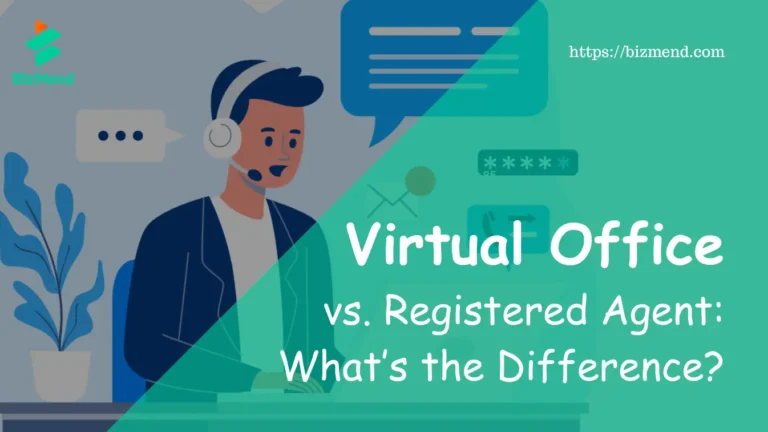“One gives you flexibility. The other prepares you for fundraising. And the choice you make now shapes everything later.”
Let’s Have the Talk: LLC or C-Corp?
You’ve decided to set up in the US, of course, with a proper channel.
Maybe you’ve read through How to Start a Business in India or Bangladesh, and now you’re eyeing the U.S. structure. Maybe Stripe, Mercury, or your investor just told you, “You’ll need to register a U.S. entity first.”
And that’s when you fall into the rabbit hole: LLC vs. C Corporation.
They both sound official. They both get you a bank account and an EIN. But they’re not the same thing. And this one choice will impact your taxes, investors, compliance, paperwork, and most importantly, your sanity.
Let’s break it down in plain English.
First, What They Actually Are
LLC (Limited Liability Company)
An LLC is like the “freelancer turned founder” structure. It’s casual. It’s flexible. It doesn’t expect you to hire a lawyer every time you breathe.
- Pass-through taxation (you pay taxes once, as an individual)
- No shares, no stockholders
- Simple compliance
- Ideal for solo founders, consultants, or remote digital businesses
Quick Note: If you’re bootstrapping, freelancing, or running a service brand—it’s a great fit.
C Corporation
This one’s more formal—think “board meetings, shareholders, vesting schedules.”
It’s the go-to if you plan to raise venture capital or issue stock.
- Double taxation (the company pays tax, and so do you if you get dividends)
- Required to issue shares
- Formal structure: board of directors, bylaws, officer roles
- Preferred by VCs, accelerators, and tech investors
Quick Note: If you’re building to scale or pitch investors—it’s expected.
The Real Differences: LLC vs. C Corp
- Taxes: Who Pays What?
LLC: You and your business are treated as one for tax purposes.
The profit goes straight to your personal income—you report it on your own tax return. Simple, no double tax.
C Corp: The business is treated like its own person.
It pays taxes first. Then, if you (as an owner) take money out—like dividends—you pay tax on that too. So yeah, two layers of tax.
Heads-up: For some foreign founders, C-Corp taxation isn’t as punishing if you reinvest everything into growth. But if you are taking money out? That’s when you feel the tax pinch.
- Ownership & Setup: How Simple Do You Want It?
LLC: Way more relaxed. One owner, two partners, five friends—it’s flexible. You set the rules. No board meetings. No complicated filings.
C Corp: This is the “suit and tie” version.
You’ll need:
- A board of directors
- Bylaws
- Shareholders
- Regular paperwork
If you’re aiming for investment, a formal structure builds trust. If you are just starting out solo, LLC feels like a better fit.
- Fundraising: Can You Bring Investors Onboard?
LLC: Not ideal for raising VC money. Investors usually stay away because LLCs don’t issue stock, and pass-through taxes complicate things for them.
C Corp: Built for fundraising. You can issue shares, create a cap table, and offer stock options—exactly what VCs want to see.
If you’re planning to pitch angels or raise rounds, C Corp is your ticket.
- Maintenance: What Are You Signing Up For Long-Term?
LLC: Low upkeep.
Annual reports, maybe a state filing. No shareholder meetings or board minutes required. Perfect for indie founders or digital businesses.
C Corp: More rules.
You’ll need to keep records of meetings, file more paperwork, and stay on top of compliance stuff.
Not scary—but if you’re not organized, it stacks up quickly.
LLC vs. C Corp: At-a-Glance Comparison
| Feature | LLC (Limited Liability Company) | C Corporation |
| Taxes | Pass-through: profits go to you, taxed once | Double tax: first, the company pays, then you pay again on dividends |
| Best For | Freelancers, consultants, solopreneurs, bootstrapped startups | Fundraising startups, venture-backed businesses |
| Structure | Flexible, no board or shares required | Formal: board, bylaws, shares, cap table |
| Fundraising Friendly? | Not ideal for VCs | Yes; investors prefer C Corps |
| Paperwork & Compliance | Low maintenance | Higher maintenance: annual meetings, minutes, filings |
| Profit Reinvestment | Fully personal; you pay taxes even if reinvested | Can reinvest at company level before personal tax kicks in |
| Ownership Flexibility | High; single-member, partners, custom agreements | Structured ownership via shares |
| Setup Speed | Fast and simple | Slightly more formal, still quick |
| Ongoing Cost | Lower annual fees and filings | Generally, higher admin costs |
| Foreign Founder Friendly? | Very | Yes, but with more moving parts |
For a Minute, Let’s Talk U.S. Business Culture
In the U.S., people care how you show up on paper.
Even solo entrepreneurs use contracts. Even two-person startups separate shares. It’s not because they’re overly formal—it’s because here, legal clarity is seen as a sign of respect.
So if you plan to do business with Americans, pitch investors, or onboard U.S. partners, they’ll notice whether your structure is solid.
That said? Americans also love speed, clarity, and action. If your idea is good and you have an EIN, most people don’t care if you’re an LLC or C-Corp, until money is involved.
Which One Should You Choose?
Choose an LLC if:
- You’re a solo founder or indie team
- You want simple compliance
- You’re not raising money soon
- You value flexibility over formal structure
- You’re testing an idea before going big
Choose a C-Corp if:
- You plan to raise VC money
- You’re applying to Y Combinator, Techstars, or similar
- You need stock options or shares
- You’re playing the long game and building a team
- You want credibility in tech/startup finance circles
Bonus Notes: Non-Residents, Read This
- You cannot form an S-Corp if you are not a US citizen or don’t have an SSN.
- LLC or C-Corp are your only real options.
- Without a Social Security Number (SSN), you’ll have to apply for an EIN by mail or fax; plan for delays.
Also, keep in mind: Stripe, PayPal, Mercury—all accept LLCs and C-Corps, as long as your structure and EIN are solid.
Final Thought: There’s No Wrong Choice, But There’s a Smart One
If you’re starting lean, testing the waters, or building on your own—go LLC.
If you’re raising capital, issuing shares, or thinking IPO (Initial Public Offering) someday—go C-Corp.
Just don’t choose based on what “everyone else is doing.” Choose based on where you are today—and where you’re willing to go tomorrow.
Because in the U.S., no one cares where you registered.
They care how you run it.
FAQ
Which is better: LLC or C-Corp?
There’s no one-size-fits-all.
Go LLC if you want flexibility, solo ownership, and simple compliance.
Go C-Corp if you plan to raise money, issue shares, or work with investors. That’s it.
Can I switch from an LLC to a C-Corp later?
Yes. You can convert—but it involves paperwork, potential taxes, and new EINs. If you know you’re raising capital, start with a C-Corp from day one.
Do investors fund LLCs?
Almost never. Most venture funds are structured in a way that can’t legally invest in pass-through entities like LLCs. C-Corp is the standard.
Is a C-Corp more expensive to maintain?
Yes. More filings, board meetings, tax returns, and formality.
But if you’re building a large or investor-backed company, it’s part of the package.
Do I pay more taxes with a C-Corp?
Possibly. C-Corps face double taxation—the company pays tax, and you pay again on dividends. The effect is manageable, though, provided you plan to keep the profits in the business or reinvest them.
Can a non-resident form a C-Corp?
Yes. Foreigners can form both LLCs and C-Corps.
But you can’t form an S-Corp unless you’re a U.S. citizen or green card holder with an SSN.
Which is easier for Stripe or PayPal?
Both LLCs and C-Corps are accepted—what matters is a clean structure, EIN, and a U.S. address. Most bootstrapped founders go LLC. Funded teams lean C-Corp.
What if I’m not sure what my business will become?
Start with an LLC. If you grow into fundraising later, you can convert.
But if you already have fundraising plans or co-founders—start C-Corp and save yourself the paperwork down the line.











